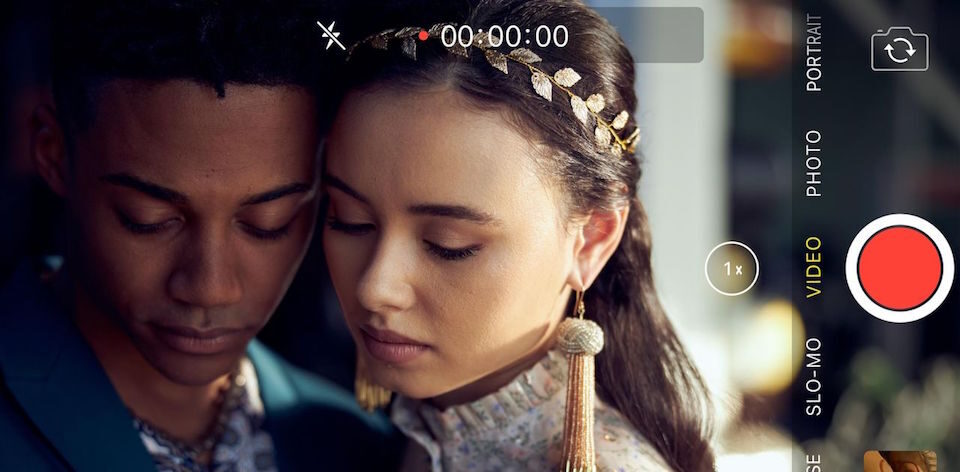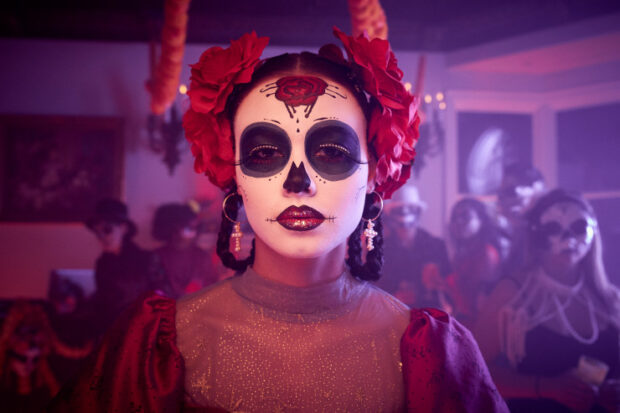The Bard’s bounty is as boundless as the sea, and never has that been truer than in counting productions of Juliet and her Romeo. In been 25 years since Baz Luhrmann ‘modernised’ Shakespeare’s most reinterpreted (and arguably misinterpreted) play, and in that time there’s been at least seven more direct film adaptations and dozen more inspired by the star-crossed love story.
Carey Williams uses the visual trappings of screenlife and social media to lay his scene, which is amongst the warring youth of Verona. Williams establishes his players by scrolling through Instagram stories, before Romeo (Camaron Engels) composes a short song dedication to his lovely Rosaline (who only appears as a Insta model by the name @dreamgrrl.roz).
We all know where the story goes from here: Romeo encounters Juliet (Francesca Noel) at a party, they fall in love, their families become displeased and several tragedies follow. Williams doesn’t change the basic plotting, but merely updates it. The titular lovers meet when Romeo spots #J on a piece of art he likes, befriending her on Insta before meeting IRL. Similarly, it’s a fatal car crash that’s the inciting incident for the war between the Montagues and Capulets.
We’ll be living with screenlife films for at least a few years to come, and they have proven to be thrilling (Searching) and heartbreaking (Language Lessons) in equal measures. Yet the problem is not in the façade as it is with the way it’s employed. Williams uses screenlife here in the same way Luhrmann used CG and title splashes: frequently and in excess. Essential moments are all viewed from the point of view of the phone user, which can be arresting in some moments (Mercutio’s death speech, for instance). At other times, Williams spends what feels like ten minutes just scrolling through text messages on screen, only to chaotically veer the plot into the last three acts without any segues.
Which is where some of the more jarring aspects of the film’s aesthetic also come to light. The language of Shakespeare is retained for key scenes — most notably the genuinely innovative ‘balcony’ scene played over FaceTime — but it’s dropped completely in others. The text on devices and in comments is contemporary, which kind of makes you wonder why the characters are speaking in Iambic pentameter at all.
It’s frustrating because there’s a lot to like here. The young and diverse cast are refreshingly earnest. When Diego Madrigal’s gorgeous widescreen shots punctuate certain key scenes, you almost wish for a more traditionally shot film that used the language of smartphones more sparingly.
The future of Shakespeare requires engagement with younger audience, and R#J is definitely a step in the right direction. The language of social media is the lens by which an entire generation views the world, and if these stories are to be told hundreds of more times, then perhaps this will speak the speech more clearly to younger Shakespeare initiates.
2021 | USA | DIRECTORS: Carey Williams | WRITERS: Carey Williams & Rickie Castaneda (based on a play by William Shakespeare) | CAST: Camaron Engels, Francesca Noel, RJ Cyler, Diego Tinoco, Russell Hornsby, Siddiq Saunderson | DISTRIBUTOR: Interface Films, SXSW 2021 | RUNNING TIME: 90 minutes | RELEASE DATE: 16-20 March 2021 (USA)







